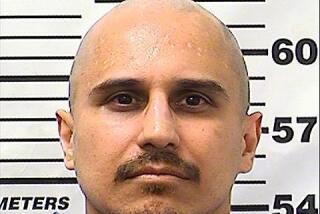Unproved Claims Against Merriman Debated
- Share via
When jurors reconvene next week to weigh the fate of convicted killer Justin Merriman, prosecutors want them to hear evidence of a dozen uncharged crimes the 28-year-old skinhead gang member allegedly committed during the past decade.
But defense attorneys say many of those alleged crimes are based on flimsy evidence and should not be presented to a jury deciding whether Merriman spends the rest of his life in prison or is executed.
“I think the court in a penalty phase needs to be careful,” defense attorney Willard Wiksell argued during a hearing Thursday.
Merriman is accused of raping, threatening, choking and battering various women since he was a teenager, and of beating several men as an adult.
Prosecutors contend that those alleged acts, some of which the jury heard about during the murder trial, show the defendant has a pattern of violent criminal behavior.
Deputy Dist. Atty. Ron Bamieh said jurors should be allowed to consider those accusations when deciding Merriman’s sentence.
But many of the uncharged crimes cannot be proved beyond a reasonable doubt, Wiksell argued, urging Superior Court Judge Vincent J. O’Neill Jr. to limit the allegations allowed as evidence during the penalty phase.
O’Neill is expected to announce his ruling this morning.
Last week, Merriman was found guilty of first-degree murder with special circumstances in the November 1992 slaying of Santa Monica College student Katrina Montgomery. The jury further determined the killing occurred immediately after a rape, propelling the case into a second phase in which the same panel will be asked to decide whether Merriman should be executed or sentenced to life in prison without parole.
The penalty phase starts Tuesday and is expected to last about a week.
Since the Feb. 13 verdict, prosecutors and defense lawyers have filed motions indicating what evidence they plan to present during the penalty phase.
Bamieh wants jurors to consider two alleged assaults on Montgomery by the defendant in the months before her death in 1992.
During the murder trial, Montgomery’s mother testified that one morning her daughter told her that Merriman tried to force her into having sex with him at his home.
A friend of Montgomery’s told jurors she observed red marks on Montgomery’s neck on a separate occasion. She said Montgomery told her Merriman had choked her after she told him she didn’t want a romantic relationship.
Criminal charges were never filed in connection with those alleged incidents. But prosecutors now want jurors to consider the witnesses’ statements as evidence those events occurred--a proposal that has drawn objections from the defense.
Prosecutors also want jurors to consider details about uncorroborated allegations of sexual assaults of three other women.
“The defendant is a serial rapist,” Bamieh argued. “And we should be able to put that evidence before [the jury].”
But Wiksell expressed concerns about the cumulative effect those uncharged crimes could have on the jury. Although state law allows such evidence to be considered, Wiksell said he fears a long list of unproven bad acts could unfairly prejudice the jury against his client, and cause them to make a decision based solely on emotion.
“I’m just worried this becomes number 67,432 in reasons to execute Mr. Merriman,” Wiksell argued.
Jurors are also expected to hear evidence next week of the loss suffered by Montgomery’s parents, siblings and other family members. And they are expected to hear testimony from psychologists who examined Merriman in custody.
More to Read
Sign up for Essential California
The most important California stories and recommendations in your inbox every morning.
You may occasionally receive promotional content from the Los Angeles Times.













